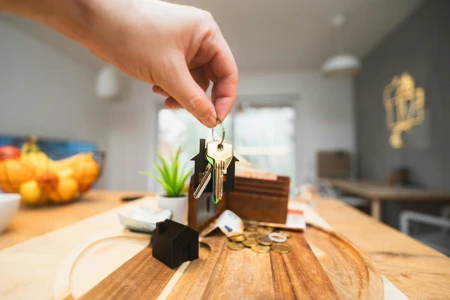Key findings
•By year 30, the financial cost of renting versus homeownership could reach up to £30.88 per day, or £11,272 per year
•Homeowners who invest the savings made over renters could see returns worth up to £338,170 over 30 years
•64% of renters believe buying a home offers greater long-term financial security
By comparing the average cost of renting versus buying over time, MAB’s findings show that homeownership not only builds equity, but also presents a long-term investment growth opportunity – one that many renters may be missing.
Financial opportunity
While renting may feel safer and more flexible in the short-term, the long-term financial trade off can be significant. MAB’s research shows that by year 2, homeowners start to save money versus renting – around £99, which if, for example, they chose to invest into a FTSE 100 tracker fund, is boosted to £104 (equating to £0.14 saved per day).
As the gap between the cost of renting and owning a home rises (i.e. annual rent payments rise, but mortgage payments remain fixed), by year 10, homeowners could save up to £12,157 compared to renters. If they opted to invest this amount, that sum could grow to £14,358, generating an additional gain of £2,202. By year 14, those invested savings could reach £39,539 – enough to fully recoup a typical first time buyer deposit. Following the same logic, by year 16, invested savings could grow to £55,547 – enough, for example, to repay the average student loan debt in England.
Over a full 30-year period, homeowners could save £206,031 in housing costs alone, not including house price appreciation. If these savings were gradually invested over time, they could yield an additional £132,139, taking the total missed financial opportunity for renters to £338,170.
In some cities, the gap is even wider. In London, the missed opportunity rises to £540,687 – or nearly £50 per day. In Bristol, renters could miss out on even more (£573,110), while in Manchester, the figure reaches £428,223. Interestingly, buyers could save more in Bristol than in London. As the monthly difference between rent and mortgage payments is much greater in Bristol, homeowners there see bigger savings earlier on.
Aspirations vs affordability
Despite the financial benefits of homeownership, many renters still believe it’s out of reach. While 65% of renters say they aspire to buy a home, 27% believe they’ll never be able to afford it. Only 8% said they prefer the flexibility of renting.
Encouragingly, only 7% of 18-24 year-olds and 11% of 25-34 year-olds say they think homeownership is beyond reach – showing optimism among younger renters. But this drops sharply with age: 56% of renters aged 55+ believe they’ll never own a home. Still, 64% of all renters agree that buying a home is more financially secure in the long-term.

Barriers to buying
The most commonly cited barriers to homeownership are:
•High property prices (61%)
•Saving for a deposit (56%)
•Job or income insecurity (32%)
•Mortgage eligibility concerns (31%)
•Lack of understanding of the process (17%)
However, many of these perceived obstacles may be more surmountable than renters realise. For instance, 56% of renters said they would consider buying if mortgage repayments matched their rent. This is becoming increasingly possible in many areas of the UK, plus, there are now mortgage products that may help in this regard. More than a quarter (28%) of respondents said they would consider buying if mortgage repayments were similar to rent, but it would depend on other costs, while only 10% said they would prefer to rent.
Many lenders also now offer mortgages with deposits as low as 5-10%. Some even offer 100% mortgage options, helping more renters take that first step. Additionally, products such as Shared Ownership, Joint Borrower Sole Proprietor (JBSP) mortgages, and first time buyer incentives can ease affordability pressures. We’re now seeing a real focus on making buying a first home more achievable, and many renters won’t be aware of how much things have changed in the last year or two.
Affordability changes also mean an average buyer who could have borrowed £200,000 a few months ago could now borrow as much as £240,000. For some renters, this could mean they don’t have to save as long for a deposit as they may have predicted. Therefore, buying their first home could become a reality, rather than something in the distant future.
With the support of a mortgage adviser, prospective homebuyers can be guided through the various options available and gain an understanding of exactly how much they could borrow based on their financial situation.
Renters may already be close
The average time taken to save for a deposit among homeowners was just 2.84 years. In contrast, the average renter has been renting for 7.43 years – suggesting many long-term renters may have already had the time to save and buy, but haven’t acted.
In fact, 12% of homeowners didn’t save at all, receiving gifted deposits – a reminder that support options exist for many first-time buyers (albeit a fortunate minority).
Ben Thompson, Deputy CEO at Mortgage Advice Bureau, commented: “Our research reveals that many renters are much closer to buying than they realise, despite the barriers they perceive. Conditions for aspiring first time buyers have improved considerably over the last year or so. In fact, there’s a real industry push to see what innovation can be brought to the market, meaning that taking that first step could be far easier than it has been for the last decade or more. We welcome and support this, believing it will create a fairer society and ensure that homeownership is now a possibility for more people. With the right information, guidance, and support, the dream of homeownership is achievable – along with the significant financial opportunities that come with it.
“It’s also possible to borrow quite a lot more now than last year. Therefore, it may well be likely that you can buy your first home much sooner than you think. With the FCA also considering changes to responsible lending rules, providing more flexibility for consumers and helping more people get onto the property ladder, now is the time to discuss your options with a mortgage adviser.
“Acting now can lead to many thousands of pounds in long-term savings and investment growth. Homeownership builds equity, offers stability, and creates a foundation for future wealth. We strongly encourage renters to speak to one of our advisers to explore their options and take the first step toward owning a home – and their financial future.”
Important information
Your home may be repossessed if you do not keep up repayments on your mortgage.
There may be a fee for mortgage advice. The actual amount you pay will depend on your circumstances. The fee is up to 1% but a typical fee is 0.3% of the amount borrowed.
About the research:
MAB’s findings are based on a combination of two streams of research:
1. Desk research conducted between April and May 2025 comparing the full costs of renting versus owning a home for first-time buyers. This involved modelling typical monthly and upfront costs using publicly available data from sources including Zoopla, the ONS, and the UK Government, alongside industry-standard assumptions. Full methodology available upon request.
a. To calculate the daily cost of renting vs buying MAB used the following calculation: (Total Missed opportunity divided by 30 years = missed opportunity per year) divided by 365 days = total missed opportunity per day. i.e. (338,170 / 30 = 11,272.333) / 365 = 30.883105
b. The same calculation was implemented across each region to find the daily and yearly cost of renting vs buying
c. The desk research is indicative of costs faced by homeowners and renters, and assumes that they remain in the same home for the thirty year period. The cost of renting could be significantly higher than recorded, due to the cost of moving home for renters which typically occurs much more frequently than with homeowners.
d. Buyers only pay stamp duty on properties worth more than £300,000 - in regions such as London and Bristol where the property prices are higher than average, borrowers would need to factor this into their calculations.
e. Typical costs in the analysis include one off costs: security deposit (5 weeks rent), deposit (buyers only), valuation fees (buyers only), mortgage arrangement fees (average) (buyers only)*, home survey fees (buyers only), conveyancing / solicitor fees (buyers only); and regular costs for both buyers and renters include council tax, utilities, broadband, contents insurance, TV licence, buildings insurance (buyers only), maintenance and repairs (buyers only). Each cost has been factored into the analysis with an annual inflation rate of 2.42%, which is the average CPI outturn in the UK since 1997 (when records began) according to the Office for Budget
Responsibility
i. *Arrangement fees are an additional charge, but depending on the individual broker firm, and the mortgage arrangement fee, also depends on the product selected by the buyer.
ii. Average total remortgaging fees have been costed into the calculations, however depending on the lender used, some of these could be waived or lenders could provide cashback to customers to recoup the cost, so this is an indicative calculation only. The assumption has been made that in the scenario above the borrower would pay these fees directly and they are not added onto the monthly repayment total. Fees include:
1. Arrangement fees: £900
2. Booking fees: £200
3. Valuation fees: £400
4. Broker fee: £299
5. Legal / conveyancing fees: £300
6. Exit fees: £150
2. A survey of 5,000 UK adults conducted by Censuswide in April 2025.

